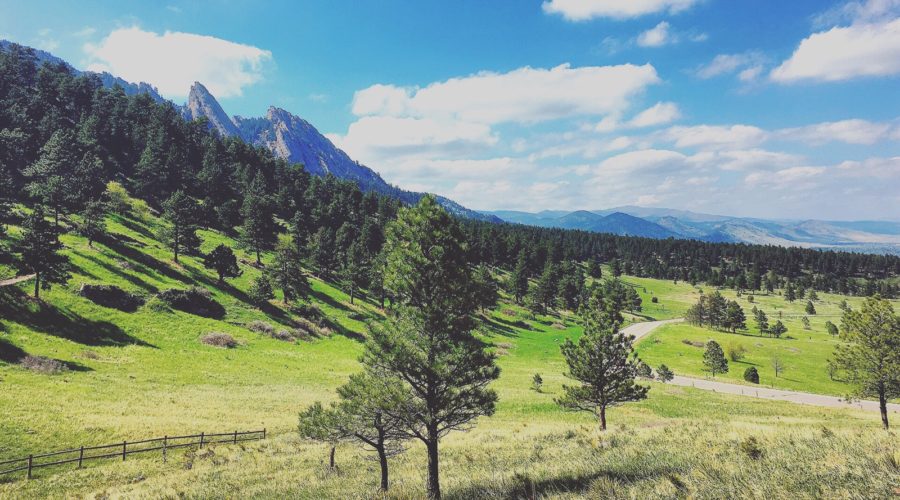This past Saturday was Halloween. In lieu of dressing up and heading out on the town, Al and I opted to stay in and have our own all-day-movie marathon, breaking only to take naps or eat.
Preparing for one of our ‘nap breaks,’ we noticed that an entire series of Bob Ross’s The Joy Of Painting was available for streaming. Al and I both have childhood memories of sitting in front of the television, mesmerized by Bob’s giant easel, soft soothing voice, and how quickly he would turn one seemingly out of place stroke on the canvas into a beautiful tree.
We decided this was the perfect show to send us to sleep.
After about ten minutes into the first episode, Changing Seasons, Bob had already created a beautiful mountain scenery surrounded by fall trees, and was about to start creating the river. He was using phrases like, ‘You have unlimited power here, this is your world,’ and ‘There are no mistakes, only happy accidents.’
I started finding myself a little envious of Bob. Here is a guy who was clearly born to do this. He knows his place, and the type of work that drives him. He knows what he loves, and he teaches other people to do the same.
I bet Bob would never feel the need to start a blog about how to make his Mondays better. During his lifetime, he was already living it.
Instead of taking a nap, I started looking up information on Bob’s life, expecting to read about an artist who struggled a little bit here and there before being picked up for The Joy of Painting and becoming a PBS icon.
The more I read, the more surprised I was. Bob actually spent twenty years serving in the United States Air Force, before making the ultimate career switch in his late 30’s.
After doing some research, I realized there were so many things that I could learn from the life and times of Bob Ross, and apply to my own life right now.
Sometimes you have to do a job you do not necessarily like, to get where you are meant to be.
Bob was quoted as saying his time in the military made him realize that he wanted a career where he would never have to yell at someone, or order them around again. He spent most of his military years stationed in Alaska, which became the foundation for the inspiration behind his iconic landscape paintings.
This made me think about how so many of us spend time stuck in jobs or careers that we don’t like, and often feel trapped into the 9-5 (or whatever other schedule) lifestyle that comes with working those jobs.
I often forget to remind myself that there can be a huge amount of value to time spent in this type of a situation. It can be difficult to see in the moment how the frustration and struggle of working a job you dislike might just be the foundation for something better.
That being said, there’s a difference to using your time in a job you don’t like to set yourself up for something greater, and becoming complacent and angry. This is something Bob nailed, yet again:
When you are stuck in a situation that doesn’t work for you; find every opportunity within it to figure out what does.
Bob developed his super-fast style of painting out of necessity and lessons from his mentor Bill Alexander. Working in the military, he would have long stretches of work, with very little downtime. He used this tiny break in his schedule to create full landscape paintings, before going back on duty.
I was so impressed by this. I spend so much time complaining about my lack of time to explore my interests outside of work, and claiming that I don’t have room for creativity, because I’m always too tired to do anything but zone out after coming home from work.
This type of attitude and thinking will get me absolutely nowhere in my career. I am sure it would have been much easier for Bob to spend his 15 minute breaks taking a quick nap instead of creating a full on scenic landscape masterpiece, but then he never would have developed his skills into what they were, allowing him to move on from his military career.
Using the resources that you have where you already are, and taking time to develop other skills in areas that truly interest you, is key to moving into a line of work that makes sense for you. The saying ‘Bloom where you’re planted’ has always annoyed me, and now I’m realizing it is because of how true it is.
Do what you love, and the money will follow (or not, but it doesn’t matter)
Bob never got paid a single dollar for his PBS show, and painted over an estimated 30,000 paintings in his lifetime. Almost all of his paintings were donated to charity or PBS during his life and after his death.
But, Bob was no dummy. He made his money through branding himself the way he did, as well as selling a line of paints and other art supplies based off of his wet-on-wet painting technique, which provided him a considerable source of income.
He spent hours painting, learning, and developing his craft without getting any money for it, simply because he loved it. He worked other odd jobs after his time in the military to have an income stream while he did this (which I imagine he probably didn’t exactly love), but continued to work on his painting and learn from his mentor, Bill Alexander. Eventually he turned his passion into his life’s work.
This is particularly inspiring to me because I think we often reason that we are too busy, not talented enough, or don’t have the right financial resources to purse the dreams that we hold on to. This is just one of the hundreds of tiny little lies we tell ourselves daily to keep from trying what we really dream of.
It doesn’t mean you have to quit your job, or empty out your life savings, or do something extreme to make the first step to living the type of life you want for yourself. I struggle with this because I always feel like if I am not getting the results I want in a short amount of time then something isn’t working.
Bob is a reminder to me to start doing the things that interest me whenever I can, regardless of how small the steps might be. The avoidance of this is one of the many reasons I put off starting this blog for so many years.
You have to start somewhere.
And, finally,
“If you don’t like it, change it. It’s your world.”
–Bob Ross
Bob went from twenty years serving in the US Air Force, to working several years as a bartender and freelance painter, to a self-made business owner and well-loved television personality. He was the living example of changing his situation when he realized one wasn’t working out for him.
I can’t count how many times I have heard people say that it is too late for them to make a career switch after spending years building up all of their work experience in one industry. They might realize after six months, or fifteen years that they want to pursue something else, or that their current career is no longer a fit for them. I have gone through this same thought process more than once.
Looking at Bob’s career, it is so clear that this just is not the case. He could have so easily never left the Air Force, and just painted on his Sunday evenings at home. We are so limited by our own fears on leaving a job, or starting over in a new field. We make up every excuse we can, that we are too old, or we wouldn’t make enough money, or everyone else in that field is more experienced.
It’s a great reminder to me that we don’t always have to follow the path we think that we should, and we have so much control over our own career and life choices. This is something I have to tell myself often, especially coming from the fear that was engrained in me from graduating college in one of the worst job markets in US history.
Regardless of whatever negative situation I am in, making excuses for why I am not trying harder to change it for the better is going to get me nowhere.
—
And a final Bob Ross quote to take this one home, because he just gets it:
“The man who does the best job is the one who is happy at his job.”







Who knew Bob’s life and paintings had so much to teach us? I’m really impressed that one lazy Saturday tv show turned into such a meaningful lesson.
Ps – Bob would probably only be proud of Rebecca’s painting.
I found this fascinating. He is way more interesting than I would have expected.